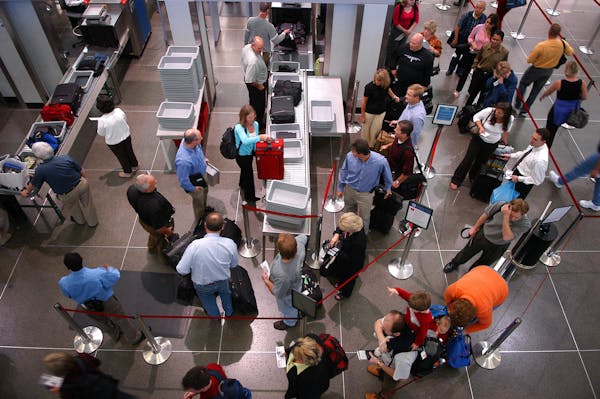Minnesota politicians have been ringing alarm bells for months about the potential harm to fliers and workers that could result from a merger between Delta Air Lines and Northwest Airlines, but only about a third of state residents surveyed this month said the federal government should block the merger.
In a new Star Tribune Minnesota Poll, 50 percent of residents said Delta's acquisition of Eagan-based Northwest "should be allowed to happen."
Meanwhile, 32 percent want the federal government to prevent the two airlines from consummating their deal and 17 percent offered no opinion. The U.S. Justice Department will determine whether the two carriers can merge.
"I don't think we have any kind of exclusive right to determine what businesses do," said Kurt Schroeder, 34, a software engineer from Rochester who participated in the poll. Schroeder argues the airline deal should go ahead, even though he described himself as "a bit of a socialist" in his political views on health care, education and wealth distribution.
Lois Bauer, 65, a retired bank teller supervisor from Kenyon in southern Minnesota, said she'd like to see the merger plans halted. If the carriers are blended into the world's largest airline, "there won't be as much competition," Bauer said.
She's worried about rising fares. Bauer and her husband chose not to fly to Arizona on any airline this month to visit their daughter because they found fares to be too expensive.
Northwest and other airlines have steadily raised their fares in response to skyrocketing oil prices.
Fifty-nine percent of those polled said they thought a Delta-Northwest merger would produce higher fares, while 26 percent said it would not have much effect. The rest of those polled voiced no opinion or envisioned lower fares from a merger.
The poll, conducted last week, consisted of interviews with 1,203 adults across the state. The results have a margin of error of no greater than 3 percentage points, plus or minus.
U.S. Rep. Jim Oberstar, a Minnesota Democrat and leading opponent of the merger, said the majority of Minnesotans surveyed understand that "this merger is going to cause airfares to climb even higher than they are now."
Oberstar, who is chairman of the House Transportation and Infrastructure Committee, said the merger would hurt the traveling public. "It will cause a cascade of mergers leaving travelers with only three major airlines to choose from, instead of the current seven now in the marketplace," Oberstar said.
Northwest denied that a merger would send fares rising. "It's a common misconception that the merger will produce higher airfares in Minnesota. It won't," said Ben Hirst, Northwest's general counsel. "Northwest and Delta compete directly on only four routes from the Twin Cities -- routes to Atlanta, Salt Lake City, Cincinnati and New York -- and there is more than enough nonstop and one-stop competition from other airlines on those routes to keep fares at competitive levels."
Based on high fuel costs, Hirst said that fares at all airlines will have to increase "in order for airlines to stay in business."
Oberstar was representing northern Minnesota in 1978 when the federal government deregulated the airline industry.
The Minnesota Poll showed that only 35 percent of residents age 60 and older said the merger should go ahead. Meanwhile, 59 percent of those ages 18 to 39 think the deal should be allowed to happen, while 53 percent of people who are 40 to 59 say it should proceed.
Darrell Winter, 71, a retired U.S. Fish and Wildlife Service employee from Audubon, Minn., is among the older residents who want the government to thwart the Delta-Northwest merger plans.
"You get one big company and they do exactly what they want to do and the people don't have a choice," Winter said. "They've got you over a barrel and you can't even take a different airline."
But many younger and middle-aged Minnesotans are open to seeing what unfolds under a merger.
Gwen Sebastian, 55, a medical transcriptionist from Blaine, remembers when Northwest was called Northwest Orient and she also flew on Pan Am and Braniff, which have since faded into history. If a merger takes place, Minnesota might "end up with a better airline and better prices," she said.
Kristi Michael, 24, of Minneapolis, is not trying to influence any decisionmakers regarding the impact of a merger because, she said, "I'm a nurse, not an economist."
The fact that 50 percent of those surveyed said the merger should go ahead "shows that most Minnesotans understand that the merger will put airline service and jobs in Minnesota on a more secure footing," Hirst said.
The poll did not uncover any geographic split on how Minnesotans view the potential merger. The results showed that 49 percent of people in the seven-county metro area want the merger to proceed, while that was the view of 53 percent of residents in the rest of the state.
The people surveyed who were most supportive of letting the merger proceed were Republicans (64 percent), college graduates (58 percent) and those earning $75,000 or more (60 percent).
Liz Fedor • 612-673-7709
